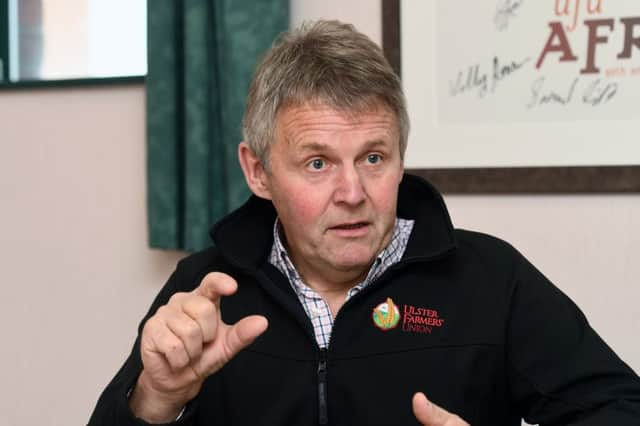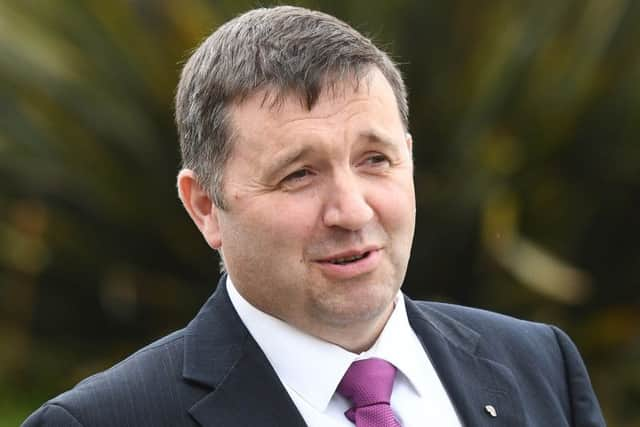Fears farmers could be impacted by shortfall in public finances


Ulster Unionist Party Leader Robin Swann and the Ulster Farmers’ Union have warned of the consequences should budgets be squeezed significantly in the years ahead.
Mr Swann said he feared that farmers could be left paying the price for the developing black hole in Northern Ireland’s public finances.
Advertisement
Advertisement
Meanwhile, UFU president Barclay Bell said an adequately resourced government department was needed to support the agriculture industry.


Mr Swann said: “It is no secret that Northern Ireland’s finances have been in a complete state of turmoil over the last number of years. The trajectory of current spending was becoming increasingly unsustainable and then we had successive Executives at Stormont which simply put off taking any key decisions at all.
“As a result Northern Ireland’s farmers now face the bleak prospect of Civil Servants having to choose between maintaining existing services or reallocating more money to education and health just to keep our schools open and some degree of normality in our health service. The harsh and brutal reality is any service across any developed nation will always come second to the healthcare of its population.
“Even though DAERA has already faced significant cuts in recent years, in each of the three scenarios published this week by the Northern Ireland Civil Service, the Department is facing an even more challenging future. At best it is looking at a £10m cut by 2019/2020 and at worst a cut of £20m.
Advertisement
Advertisement
“That level of reduction in spending simply cannot be made without having a direct impact on frontline services. Even within the best case scenario DAERA has warned that staff numbers will have to be reduced, existing rural development and environmental programmes will be scaled back, and work on TB eradication deferred. It is the latter that would potentially have the biggest impact as Northern Ireland could quite easily slip from its already mixed record of actually tackling what remains a blight on many farming families this Christmas.


“It also looks increasingly likely that the budget for the Farm Business Investment Scheme will be much lower that the anticipated share of the overall £250m package previously agreed to. Whilst this is something I have repeatedly warned of over the last couple of years, claims that have been met with silence from DAERA, it now appears inevitable that the final expenditure will be much closer to £40m for the foreseeable future.”
He added: “Finally, I fear the loss of staff could have a direct impact on the accessibility of DAERA Direct offices, but whilst we have also been told the issuing of CAP payments could be delayed I am confident that enough progress has been made in recent years to allow this to be averted.”
The Ulster Farmers’ Union says the recently published budgetary outlook is bleak reading for a key sector of the local economy. Its concerns relate to proposed cuts to the budget of the Department of Agriculture, Environment and Rural Affairs (DAERA).
Advertisement
Advertisement
“We recognise the importance of properly funding health and education but agri-food is one of the biggest contributors to the economy. It is worth £4.5 billion and employs over 100,000 people across Northern Ireland. We need an adequately resourced government department to support the industry, especially with Brexit on the horizon,” says UFU president, Barclay Bell.
The UFU is concerned about the impact of a possible 11 per cent reduction in the DAERA budget in 2019/2020.
“This will be a critical time in terms of Brexit and there are significant implications for the department’s strategic policies. It is likely to restrict options for tackling bovine TB. Cuts could block sustainable land use measures to improve soil management and deliver environmental benefits. Environmental and rural development programmes could both be scaled back. It’s a grim outlook for farm families and rural communities,” says Mr Bell.
CAP payments could also suffer, as pressure on staff reduces DAERA’s ability to process and release payments. The UFU says efficiency in making payments has been crucial for farm businesses in recent years.
“This has ensured the viability of many farms and helped with cash flow. We will continue to monitor these proposals and will meet DAERA in the new year to discuss the implications,” he added.